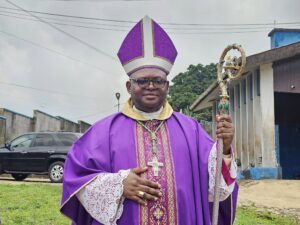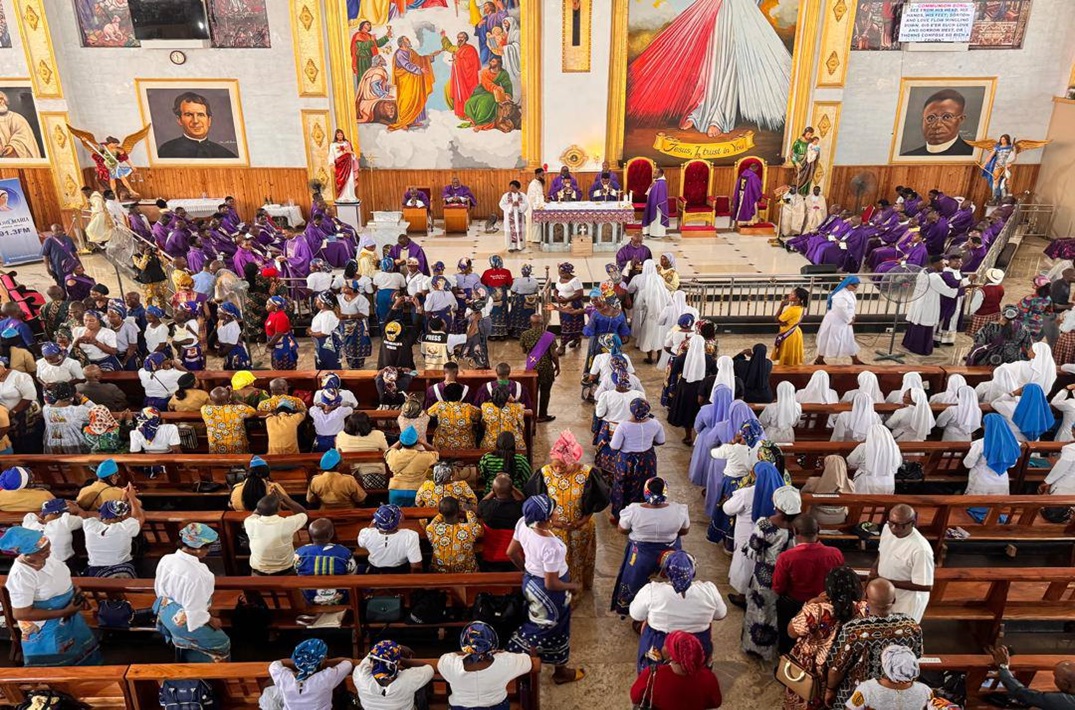By Paschal Norbert
NAIROBI, APRIL 10, 2025 (CISA) – As the final cathedraticum celebration for 2025 in the Archdiocese of Abuja wrapped up on April 7 at St. Gabriel’s Pastoral Area, Bmuko, the faithful across Nigeria continue to reflect on the deep meaning and enduring relevance of this ancient ecclesiastical tradition. With all eight deaneries of the archdiocese having hosted the annual event, the cathedraticum stands as a vibrant sign of communion between the bishop and his people. One rooted in mutual support, mission, and shared responsibility.
The cathedraticum, derived from the Latin word cathedra, meaning “bishop’s seat,” refers to the annual offering made by the faithful to the diocesan bishop. It is both a symbolic and practical expression of unity with the bishop, whose role is to shepherd the local church.
According to Canon Law, “The bishop has the right to obtain the means which are necessary for carrying out his pastoral functions in the diocese” (Canon 1263). This canon provides the foundation for cathedraticum, which allows the bishop to fulfill his wide-ranging pastoral obligations. It is more than a financial collection; it is an act of love and support for the ministry of the bishop and the overall mission of the Church.

Speaking to the faithful of the Catholic Diocese of Buea in Cameroon, Bishop Michael Miabesue Bibi offered a pastoral reflection on the cathedraticum and its significance.
“Through the cathedraticum, Christians demonstrate their unity and commitment to supporting the bishop in his endeavours,” he said, explaining further “Donations are made to aid the bishop in reaching out to those in need and who are suffering in various ways.”
This spirit of communal giving and solidarity is echoed in the celebration of Family Day in Kenya—a highly anticipated event across many dioceses where the faithful, grouped into deaneries, come together to celebrate their faith, raise funds, and affirm their shared identity as one Church family. During Family Day, each deanery contributes according to its capacity, offering financial support and gifts to sustain the needs of the diocese. Similarly, in the cathedraticum, each parish makes its contribution to the diocese, reinforcing a sense of unity and belonging within the broader spiritual community.
These donations, according to Bishop Bibi, are not merely symbolic. They play a crucial role in funding the Church’s pastoral and social activities, from evangelization to education, healthcare, and relief for the poor. The cathedraticum becomes a channel through which the bishop can identify and respond to the needs across the diocese.
“The bishop may allocate resources to different parishes and institutions based on their needs,” Bishop Bibi said, adding “Despite the varying requirements of each parish, the bishop ensures that resources are distributed equitably. For example, one parish may receive assistance this week, while another receives help the following week.”
In this way, the cathedraticum affirms the bishop’s role as a steward and shepherd, ensuring that the Church’s mission reaches even the most remote or struggling communities. Each contribution becomes part of a larger mosaic of faith-driven service.
The funds collected, Bishop Bibi noted, are used judiciously, with significant amounts spent annually on Church activities. This includes maintaining parishes, supporting clergy, financing formation programs, and carrying out charitable works.
“The cathedraticum aims to manage its resources effectively, ensuring that they are used for the betterment of the church community,” he added.
The recently concluded cathedraticum celebrations across the Catholic Archdiocese of Abuja have once again brought to the fore the central role of the faithful in sustaining the life of the Church. Through their generous offerings, Catholics across Nigeria and beyond are not only upholding a longstanding tradition, they are actively participating in the mission of the Church, building communion, and empowering their bishop to lead with both compassion and courage.
In a world increasingly defined by individualism and fragmentation, cathedraticum reminds the faithful of their shared identity and collective mission. It is, at its heart, a beautiful expression of the Church as a family, where every gift, however small, plays a part in nurturing the whole.
